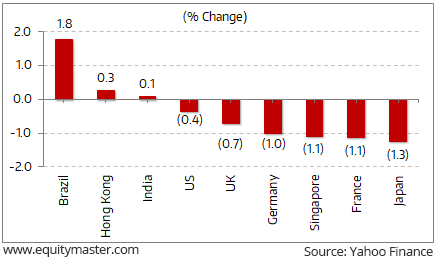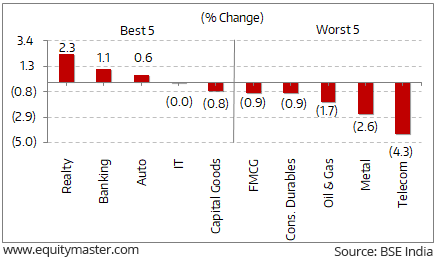Global financial markets ended the week on a mixed note. In the US, the Dow industrials ended the week down 0.4%, while the S&P 500 declined 0.1%. It was their biggest two-week declines since mid-August, when worries about rising tensions between North Korea and the US weighed on stocks. Debate over the prospect of a significant tax overhaul in the US has swung stocks this week. On Thursday, the House of Representatives passed a bill that would reduce the corporate tax rate to 20% from 35%. Still, hurdles remain as the focus now shifts to the Senate, which is contending with debate over its own bill.
European equities ended the week lower on the back of disappointing corporate earnings and euro strengthening. Europe’s major indexes began the week in the red, briefly rose midweek on the back of some encouraging economic data, but then receded again by the end of the week. UK and French markets were down by 0.7% and 1.1% respectively this week, while German indices were down by 1% over the week.
Japanese stocks declined for the week, ending a nine-week stretch of consecutive gains for the benchmark Nikkei 225 Stock Average. The Nikkei fell by 1.3% and closed at 22,397.
Key World Markets During the Week

Back home, benchmark indices in India bounced back on Friday and ended the week on a positive note. This on the back of a sovereign ratings upgrade of the Indian government’s bonds by the US credit rating agency Moody’s. The BSE Sensex ended the week marginally higher by 0.1%.
BSE Indices During the Week

Now let us discuss some key economic and industry developments during the week gone by.
In news from the economy, pointing that revival of infrastructure sector is in the primitive stages, credit rating agency, ICRA in its latest report has said that infrastructure companies with exposure to airport and highway sectors are doing well by showing improvement in their operational and financial performance. However, many infrastructure players are struggling with stressed balance sheet problem.
As per ICRA’s report, aggregate debt of infra companies at a standalone level as of March 2017 rose only marginally from March 2016, while at the consolidated level, debt declined by 12% year-on-year to Rs 1.39 trillion from Rs 1.58 trillion, on account of stake disinvestment in subsidiaries or projects by the infra companies.
The report also found that the order book position of most construction companies has improved to over three times their last reported annual revenues, with the government’s efforts to improve the country’s infrastructure. ICRA, however, noted that the sector continues to face funding issues, as banks are still grappling with high Non-Performing Assets woes.
According to data released by the Central Statistics Office (CSO), retail inflation as measured by the Wholesale Price Index (WPI) rose to 3.59% in October, a sharp rise from of 2.6% in September 2017. Wholesale inflation rate, measured by the wholesale price index (WPI), is a marker for price movements in bulk buys for traders and broadly mirrors trends in shop-end prices. The index portrays new series of WPI data released by the government earlier this fiscal, with 2011-12 as the base year, replacing existing the base year of 2004-05.













Leave A Comment